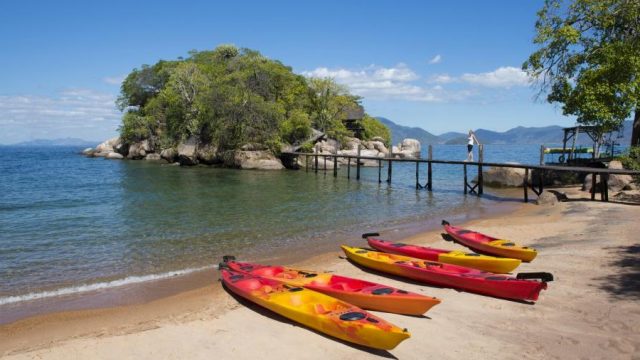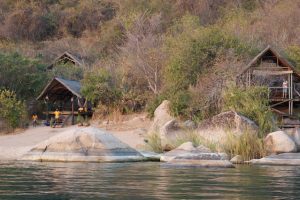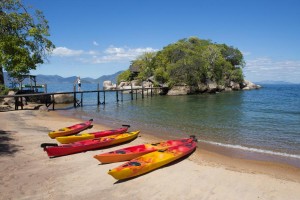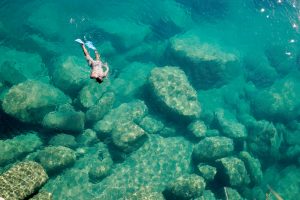Africa is blessed with some spectacularly beautiful islands. Among the most famous are Mauritius, with its icing sugar beaches, warm ocean and excellent food; the Seychelles, which offers the best in luxury beach resorts; and Zanzibar, with abundant marine life and exotic culture and history. These are the islands on brochures: the ones that inspire people to book flights from the other side of the world.
However, Africa has many more islands that are just as lovely, but don’t have the hype (or the crowds) of the more marketed atolls.
The tiny landlocked Malawi (a country mostly overlooked by foreign tourists) is home to two of my favorite African islands: Domwe and Mumbo. These under-visited (yet brochure-worthy) islands are located in Lake Malawi, Africa’s third-largest lake – a glittering turquoise body of water that makes up a fifth of the country’s area. Domwe and Mumbo lie in Lake Malawi National Park, at the southern end of the lake, offshore from the beach resort village of Cape Maclear. One of the best things about staying on the islands is how you get there: by kayak.
Kayak Africa runs the environmentally-friendly intimate camps on the two otherwise uninhabited islands, and they offer an island-hopping adventure package, where you spend two nights sleeping on each island and travel between the two by kayak. You start off by launching off from Cape Maclear and paddling to Domwe, which is only three miles away. Your luggage is transported by boat so all you need to have is sunglasses and your GoPro.
Arriving on Domwe, Malawi’s largest uninhabited island, feels a bit like being a castaway. Looking at the rustic wood-frame camp of just three tent rooms and a communal dining area built between the boulders and trees above the small sandy beach we landed on, I immediately thought of Robinson Crusoe. Other than the few structures there’s nothing but bush and boulders surrounded by the crystal-clear, gently lapping waters of the lake.
Unlike the unfortunate castaway in that shipwreck story, at Domwe you’re treated to rather a few more comforts. In three wooden buildings set on stilts overlooking the beach (and the glorious sunsets) are fully furnished tents with comfortable beds and linens. In the open-air dining area you can cook your own meals and enjoy them under the stars. There are shared eco-toilets, and hot bucket showers are taken under a baobab. At night, there are paraffin lamps and the sound of insects. It’s blissfully simple – barefoot travel at its best.
In terms of activities, you can take out the kayak and paddle around the calm lake, or go snorkeling. Lake Malawi is home to over a thousand species of cichlid fish, which are easy to spot with the great visibility. Other than that, there’s not much to do except soak up the silence: read a book on the beach, walk through the bush and enjoy the long sunsets.
After two days on Domwe (which felt like weeks in terms of relaxation levels), I hopped on the kayak again to paddle five miles to Mumbo Island. Even more beautiful than Domwe, Mumbo is made up of one main island and then a smaller atoll linked to the main one by a wooden walkway over the water. The smaller island is where the accommodation is: rustic-chic rooms which only sleep 14 guests in total (and are more luxurious than Domwe) made of reeds, timber, thatch and canvas with mosquito net-shaded beds, en suite hot bucket showers and eco toilets and private decks adorned with hammocks. While the bed was comfy, I ended up sleeping at night in the hammock to see the lake twinkle with hundreds of fishing boat lanterns.
Both islands are covered with miombo, fig and baobab trees and surrounded by impossibly blue water and smooth boulders, off which you can dive into the refreshing lake. On the main island there’s a lovely beach with hammocks and loungers where you can easily while away lazy days with a book, as well as a lounge with games to play under a big baobab tree, and a dining room which overlooks the beach. Simple but delicious meals (think rustic pizza, big salads, freshly baked bread, pasta and fish) are served buffet-style and are accompanied by the highly recommended homemade “Mumbo Island” brand sweet chilli sauce. Come night time and it’s pure romance – the electricity-free islands are lit up with lanterns and candles (no wonder this is a popular place for honeymooning couples).
On Mumbo activities range from the no-effort-at-all category (suntanning on the beach, napping on your hammock, sundowner boat trips) to the bit-more-effort-but-hardly-taxing: kayaking, snorkeling, swimming or scuba diving – the water around Mumbo was the clearest I saw on the lake. If you’re lucky you’ll get to swim with the island’s only mammals: playful spotted-necked otters.
Days slide into a calm rhythm: you wake up early with the sun, and a tray of coffee, tea and biscuits is delivered to your tent flap so you can laze in bed watching dawn break over the lake and listening to the cries of fish eagles before you get up for breakfast. You spend the day in or near the water, eating lunch washed down with Malawian beer in your bathing costume, having an afternoon siesta and then drinking gin and tonics (made with great Malawian gin) on your deck, on a boat or on the beach as the sun sinks below the horizon. After drinks around the fire with the other guests, a three-course dinner and some South African wine, you retire to bed early to read under a lamp or lie on your hammock gazing up at a sky awash with stars.
If you need room service, huge menu selections, air conditioning, wi-fi and satellite TV, Mumbo and Domwe islands are not for you. If, like me, you relish a chance to escape your cell phone, the whirr of electricity generators, cars, and crowds, you can’t get much better than these two island gems in one of Africa’s friendliest and most beautiful countries.




